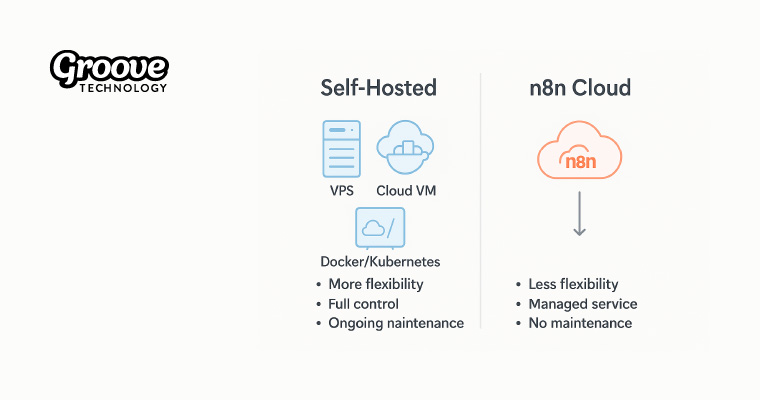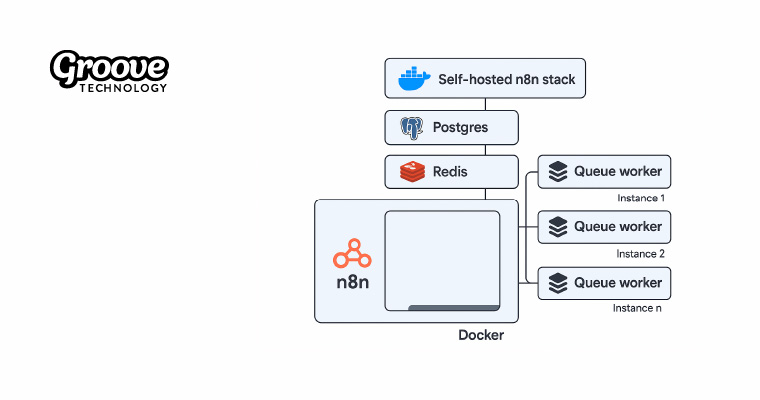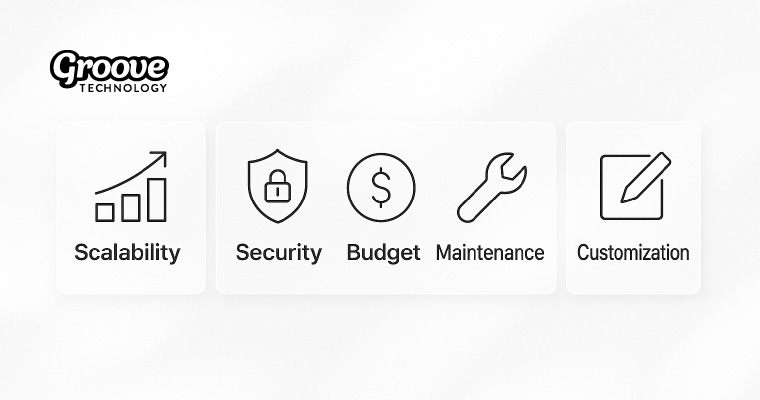Practical n8n Hosting Strategies: How to Deploy, Scale, and Manage Your Automation Workflows
When it comes to automating complex workflows across your business, n8n offers unmatched flexibility. However, to unlock its full potential, you need a reliable n8n hosting setup. Whether you are a solo developer, a startup, or a large enterprise, understanding your hosting options ensures that your automations are secure, scalable, and performant.
In this guide, we’ll walk through everything you need to know about hosting n8n — from self-hosted deployments to cloud-based solutions — and how Groove Technology can help you design and manage a scalable automation infrastructure.

What is n8n Hosting?
n8n hosting refers to the environment where your n8n instance runs. It’s the foundation that powers all your automated workflows — from simple email notifications to complex multi-system data synchronizations.
Proper n8n hosting ensures:
- High availability and uptime
- Secure credential storage
- Scalable execution of workflows
- Fast response times for webhooks and API triggers
Depending on your technical expertise and project needs, you can either self-host n8n on your own servers or choose managed services like n8n Cloud.
Self-Hosted n8n: Full Control and Flexibility
Self-hosting n8n gives you complete control over your environment, integrations, and scaling strategy. This is ideal if you need custom nodes, advanced security policies, or integration with private infrastructure.
Popular self-hosting options include:
- VPS Hosting (e.g., DigitalOcean, Linode, Hetzner): A cost-effective solution where you rent virtual servers to host your n8n instance. VPS hosting offers flexibility for small to medium workloads, giving you root access and control over software installations and security.
- Cloud VM Hosting (e.g., AWS EC2, Azure VMs, Google Compute Engine): Ideal for businesses that need scalable, reliable infrastructure. Cloud VM hosting lets you provision and scale virtual machines on demand, integrate n8n with other cloud-native services, and leverage high-availability zones and backup systems.
- Container Hosting (e.g., Docker, Kubernetes): Best for teams needing portability, automation, and microservices architecture. Running n8n inside Docker containers or orchestrating them with Kubernetes allows for rapid scaling, efficient resource utilization, and smooth deployment pipelines.

Benefits of self-hosting:
- Total flexibility over system configuration and integrations: Self-hosting allows you to fine-tune every aspect of your n8n instance — from server specifications and database configurations to workflow execution parameters and authentication layers — to match your technical and business needs.
- Custom domain support with HTTPS: You can set up n8n on a branded custom domain (e.g., automation.yourcompany.com) and configure SSL certificates for encrypted HTTPS traffic. This enhances security and provides a more professional user experience.
- Ability to integrate with internal/private APIs: Hosting n8n within your own infrastructure lets you connect securely to internal services, private APIs, or on-premises systems without exposing sensitive endpoints to the public internet.
- Scalability via queue mode and distributed workers: By enabling queue mode and adding distributed worker instances, you can horizontally scale n8n to handle large volumes of webhook events, scheduled executions, and data-heavy workflows without service interruptions or bottlenecks.
Common considerations:
- Server provisioning, updates, backups, and security patches: When self-hosting n8n, you're responsible for creating and maintaining the server environment. This includes applying security patches, updating software dependencies, and ensuring uptime and performance.
- SSL certificates, database storage, and scaling infrastructure: You must manually configure HTTPS certificates for secure communication, set up persistent database storage for workflows and credentials, and design scaling solutions such as load balancers, queue systems, and backup plans.
- DevOps expertise required: Operating a self-hosted n8n environment demands moderate to advanced DevOps skills, covering Linux server management, networking, monitoring, container orchestration (if using Docker/Kubernetes), and basic database administration.
n8n Cloud: Managed Simplicity
If you prefer a fully managed experience, n8n Cloud is the official hosted solution by the n8n team. It's ideal for teams who want to build and deploy workflows quickly without handling server maintenance.
Key features:
- Zero infrastructure management
- Automatic updates and backups
- Built-in queue workers for scaling workflows
- GDPR compliance and secure credential storage
However, n8n Cloud has some limitations:
- Less control over custom node development
- No custom domain branding
- Limited database backend options compared to self-hosted setups
Essential Considerations for n8n Hosting
Before choosing your hosting model, think about:
- Scalability Needs: Consider the expected traffic and workload your n8n instance will handle. High volumes of webhook events, API triggers, or data processing will require horizontal scalability through queue mode, distributed workers, or cloud-native orchestration tools like Kubernetes.
- Security Requirements: Determine whether your data privacy obligations demand features like private VPCs, firewall rules, role-based access control, or integration with secure identity providers. Self-hosted deployments offer more room for custom security hardening, while n8n Cloud ensures compliance out-of-the-box.
- Budget Constraints: Assess both upfront and recurring costs. Self-hosting might save on licensing but requires investment in server maintenance, backups, monitoring, and DevOps time. n8n Cloud has predictable subscription pricing but charges based on usage tiers.
- Maintenance Resources: Evaluate whether your team has the in-house expertise and time to maintain uptime, apply patches, troubleshoot outages, and handle scaling. If not, a managed solution like n8n Cloud may better fit your needs.
- Customization Needs: If your workflows rely on custom-developed nodes, integration with internal tools, or non-standard database backends, self-hosting gives you full flexibility to modify and extend n8n’s behavior to suit your exact requirements.
Choosing the right hosting approach early helps you avoid costly migrations later.

Groove Technology’s Expertise in n8n Hosting Solutions
Groove Technology brings over 10 years of software outsourcing experience across Australia, Europe, the US, and the UK. Our development team is highly capable in n8n hosting, as well as cloud-native tools like Docker, Kubernetes, AWS, Azure, and GCP.
We help companies:
- Design scalable n8n architectures tailored to business workflows
- Set up self-hosted n8n deployments with Docker, Postgres, Redis, and Nginx
- Build secure CI/CD pipelines for workflow delivery and update management
- Implement queue mode execution for large-scale workflow processing
- Optimize monitoring, logging, and disaster recovery strategies
Whether you’re just getting started or scaling across multiple teams, Groove Technology ensures your n8n hosting is production-ready, secure, and future-proof.
Final Thoughts
Choosing the right n8n hosting strategy is crucial for building resilient, efficient automation systems. From complete control with self-hosting to managed simplicity with n8n Cloud, the right setup depends on your specific goals and capabilities.
If you want expert help in setting up or optimizing your n8n hosting environment, contact Groove Technology. Let’s build a smarter, scalable automation infrastructure that moves your business forward.







